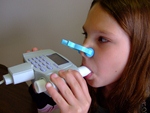Breathing Tests

Spirometry
- Spirometry measures:
- how much air you can blow out, and
- how fast you can blow air out.
Why is spirometry done?
Spirometry can help your doctor to:
- Diagnose lung conditions such as asthma and chronic obstructive pulmonary disease (COPD)
- Check the current condition of your lungs. It is possible that your lung condition has changed.
- Help discover the cause of shortness of breath
- Check the effectiveness of medication, and to make a change in prescription if that is necessary.
How is the test performed?
You will be asked to breathe through a mouthpiece while wearing a nose clip. The tester will coach you to take in as big a breath as possible. You will then blast the air out as fast as you can until your lungs feel completely empty. You may then be asked to take another deep breath in again. You will do this three times or more. You may also be given a medication to breathe in. The test will then be repeated to show if your lungs have responded to the medication.
How to prepare for the test
- Do not smoke for 1 hour before test
- Do not drink alcohol within 4 hours of test
- Do not eat a large meal within 2 hours of test
- Please wear loose clothing
- Do not perform vigorous exercise within 30 minutes of test
Video of Dr. Roger Goldstein Talks About Spirometry
A Demo Video of Spirometry
Pulmonary Function Tests
Why are pulmonary functions test done?
Pulmonary function tests are a variety of tests that examine how well the lungs work. Pulmonary function tests include spirometry to diagnose and manage COPD and asthma. Other tests also include lung volume testing which measures the volume of air in the lungs and diffusion capacity which measure how much oxygen enters the bloodstream.
How is a pulmonary function test performed?
The tests are not painful, but they require you to use your maximal effort to blow out and breathe in air. The tester will coach you to breathe in a variety of ways. These tests are repeated several times. Often after you have performed part of your pulmonary function test, a medication is given to open up your airways (bronchodilator) and then the test is repeated.
How to prepare for the test
* Do not smoke for 1 hour before test
* Do not drink alcohol within 4 hours of test
* Do not eat a large meal within 2 hours of test
* Please wear loose clothing
* Do not perform vigorous exercise within 30 minutes of test
* Your doctor may ask you not to take certain medications before your test
How do I receive a referral for a breathing test?
In Saskatchewan, pulmonary function tests are performed in many locations. Full pulmonary function tests are available in most larger cities. To inquire about a breathing test, speak to your doctor or nurse practitioner to determine if you should have a breathing test and which test is best for you.
During the COVID-19 pandemic, breathing tests may not be as available as heavy breathing is required and may increase the risk of spreading COVID-19.
